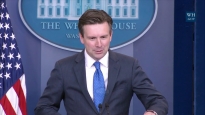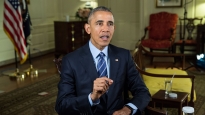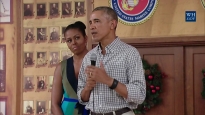President Obama on Hiring Veterans
June 01, 2012 | 26:15 | Public Domain
President Obama discusses his proposal for the creation of a Veterans Jobs Corps from a Honeywell manufacturing facility in Minnesota.
Remarks by the President on Veterans Jobs -- Golden Valley, Minnesota
Honeywell Golden Valley Facility
Golden Valley, Minnesota
12:18 P.M. CDT
THE PRESIDENT: Hello, Golden Valley! (Applause.) It is good to be back in Minnesota. (Applause.) It is good to see your Governor, Mark Dayton, here. (Applause.) On the way over we were talking about making sure the Vikings were staying. (Applause.) Now, that’s a hard thing for a Bears fan to do. (Laughter.) But I was rooting for the Vikings sticking around here -- and the Governor did a great job. You were praying, too, huh? (Laughter.) Absolutely. Prayer never hurts. It helps.
You got two outstanding Senators, Amy Klobuchar -- (applause) -- and Al Franken. (Applause.) Your mayor, Shep Harris is here. (Applause.) Outstanding congressional delegation in the house. Give them a big round of applause. (Applause.) And I thought Ryan was really good, so give him a big round of applause. (Applause.) He’s a natural.
Now, one of the last times I was here was last August. We took a bus tour around the state. I needed a little “Minnesota nice.” (Laughter.) I stopped for some pie in Zumbrota. I held a town hall in Cannon Falls. Amy and Al were there. I think Al ate my pie, in fact. (Laughter.) And I spent a lot of time talking with folks who’d spent the past couple years making their way through a tough economy.
And today, we’re still fighting our way back from the worst economic crisis since the Great Depression. The economy is growing again, but it’s not growing as fast as we want it to grow. Our businesses have created almost 4.3 million new jobs over the last 27 months, but as we learned in today’s jobs report, we’re still not creating them as fast as we want. And just like this time last year, our economy is still facing some serious headwinds. We had high gas prices a month, two months ago, and they’re starting to come down, and they were spiking, but they’re still hitting people’s wallets pretty hard. That has an impact. And then, most prominently, most recently, we’ve had a crisis in Europe’s economy that is having an impact worldwide, and it’s starting to cast a shadow on our own as well. So we’ve got a lot of work to do before we get to where we need to be. And all these factors have made it even more challenging to not just fully recover, but also lay the foundation for an economy that’s built to last over the long term.
But that’s our job. From the moment we first took action to prevent another depression, we knew the road to recovery would not be easy. We knew it would take time. We knew there would be ups and downs along the way. But we also knew if we were willing to act wisely, and boldly, and if we were acting together, as Americans; if we were willing to keep at it; if we were willing to roll up our sleeves and never quit –- then we wouldn’t just come back, we’d come back stronger than ever. That was our belief. (Applause.) And that continues to be my belief.
We will come back stronger, we do have better days ahead, and that is because of all of you. That’s because of all of you. (Applause.) I’d place my bets on American workers and American businesses any day of the week. (Applause.) You’ve been fighting through this tough economy with resilience and grit and innovation. Honeywell is a great example of a company that’s doing outstanding work, and I want to acknowledge Dave Cote here who has been –- (applause) -– serving on my Jobs Council and doing a lot of great work.
That’s why our auto industry has come roaring back. It’s why manufacturing is consistently adding jobs for the first time since the 1990s. (Applause.) All that is happening because of you. Everybody here plays by the rules. You work hard. You meet your responsibilities. And you deserve leaders who do the same -- leaders who will stand shoulder to shoulder with you and do everything possible to strengthen the middle class and move this economy forward. That’s what you deserve. (Applause.)
Look, we can’t fully control everything that happens in other parts of the world -- disturbances in the Middle East, what’s going on in Europe. But there are plenty of things we can control here at home. There are plenty of steps we can take right now to help create jobs and grow this economy.
Now, let me give you a couple examples. I sent Congress a jobs bill last September full of the kinds of bipartisan ideas that would have put our fellow Americans back to work and helped reinforce our economy against some of these outside shocks. I sent them a plan that would have reduced the deficit by $4 trillion in a way that is balanced -- that pays for the job-creating investments we need by cutting unnecessary spending, but also by asking the wealthiest Americans to pay a little more in taxes. (Applause.)
And I’ll give them a little bit of credit: Congress has passed a few parts of that jobs bill, like a tax cut that’s allowing working Americans to keep more of your paychecks every week. That was important. I appreciated it. But Congress has not acted on enough of the other ideas in that bill that would make a difference and help create jobs right now. And there’s no excuse for it. Not when there are so many people out there still looking for work. Not when there are still folks out there struggling to pay their bills. It’s not lost on anybody that it’s an election year –- I understand that; I’ve noticed. (Laughter.)
AUDIENCE MEMBER: Four more years! (Applause.)
THE PRESIDENT: But we’ve got responsibilities that are bigger than an election. (Applause.) We’ve got responsibilities to you.
So my message to Congress is: Now is not the time to play politics. Now is not the time to sit on your hands. The American people expect their leaders to work hard no matter what year it is. The economy still isn’t where it needs to be. There are steps that could make a difference right now -- steps that can also serve as a buffer in case the situation in Europe gets any worse.
So, right now, Congress should pass a bill to help states prevent more layoffs, so we can put thousands of teachers and firefighters and police officers back on the job. (Applause.) Layoffs at the state and local levels have been a chronic problem for our recovery, but it’s a problem we can fix.
Congress should have passed a bill a long time ago to put thousands of construction workers back on the job rebuilding our roads and our bridges and our runways. (Applause.) Since the housing bubble burst, no sector has been hit harder than the construction industry, and we’ve got all this stuff that needs fixed. Remember that bridge here in Minnesota? So this is a problem we can fix. Let’s do it right away.
Instead of just talking about job creators, Congress should give small business owners a tax break for hiring more workers and paying them higher wages. We can get that done. (Applause.) We can get it done right now. Let’s not wait.
Right now, Congress should give every responsible homeowner the opportunity to save an average of $3,000 a year by refinancing their mortgage. We’ve got historically low rates right now. (Applause.) I was with a family in Reno, Nevada, a couple weeks ago. They got a chance to refinance -- even though their home was underwater -- put that money back in their pockets because we had taken some steps as an administration to make that available for those who have mortgages held by government agencies like the FHA or a government guarantee. But not everybody has those kinds of mortgages. I want everybody to have those same opportunities.
I assume there are some folks here who could use $3,000 a year. (Applause.) Let's get that done right now. That means there are going to be -- if you have $3,000 a year extra, that helps you pay down your credit cards. That helps you go out and buy some things that your family needs, which is good for business. Maybe somebody will be replacing some thingamajig for their furnace. (Laughter.) They've been putting that off. But if they've got that extra money, they might just go out there and buy that thing. Right? (Laughter and applause.)
Right now, Congress needs to extend the tax credits for clean energy manufacturers that are set to expire at the end of this year. I was talking to Dave Cote. The issue of energy efficiency and everything we need to do to shift away from dependence on foreign oil, we're making huge progress. (Applause.) We're actually importing less oil than any time in the last eight years. We're down under 50 percent, but we can do more.
And these clean energy companies, they're hiring folks. They're helping us break dependence on foreign oil. It's part of a package of stuff that Honeywell is doing a lot of work on. But almost 40,000 jobs are on the line if these tax credits expire. Why would anyone in Congress walk away from those jobs? We need to pass those tax credits right now. (Applause.) We need to pass them right now. (Applause.)
It’s long past time we started encouraging what a lot of companies have been doing lately, which is bringing jobs back to this country. (Applause.) And some of them are coming to Minnesota. The Governor and I were talking in the car about some companies coming back -- Red Bull, right, coming back. But let's give more incentive. It's time for Congress to end tax breaks for companies that ship jobs overseas. Let's use that money to cover moving expenses for companies that are bringing jobs back to America. (Applause.) That would make a difference right now.
So those are all steps that we could be taking to strengthen the economy, to provide us some insurance if the situation overseas starts getting worse so we can control our own destiny, keep this recovery moving forward.
Which brings me to the last thing Congress should do to help businesses create jobs -- that’s why I’m here at Honeywell today. I believe that no one who fights for this country should ever have to fight for a job when they come home. (Applause.) And for Congress, that means creating a Veterans Job Corps so we can put our returning heroes back to work as cops and firefighters, on projects that protect our public lands and resources. And they should do it right now. They should do it right now. But if we’re going to serve our veterans as well as they’ve served us, we’ve got to do even more.
We just observed Memorial Day, which makes us think about the extraordinary sacrifices so many make. But we've got to make sure we translate words into action. We can't just be in a parade, can't just march. We also have to deliver for our veterans.
Over the past three decades -- over the past decades, rather, more than 3 million servicemembers have transitioned back to civilian life. And now that the war in Iraq is over and we’re starting to wind down the war in Afghanistan -- (applause) -- over a million more of those outstanding heroes, they're going to be joining this process of transition back into civilian life over the next few years.
Now, just think about the skills these veterans have acquired at an incredibly young age. Think about the leadership they’ve learned -- 25-year-olds, 26-year-olds leading platoons into unbelievably dangerous situations, life-or-death situations. Think about the cutting-edge technologies they’ve mastered; their ability to adapt to changing and unpredictable situations -- you can’t get that stuff from a classroom.
I mean, these kids, these men, these women, they’ve done incredible work, and that's exactly the kind of leadership and responsibility that every business in America should be wanting to attract, should be competing to attract. That's the kind of talent we need to compete for the jobs and the industries of the future. These are the kinds of Americans that every company should want to hire. (Applause.)
And that’s why, here at Honeywell, you’ve made it a mission to hire more veterans. (Applause.) And let me say, Dave is incredibly patriotic, loves his veterans, but this -- Honeywell is doing this not just because it feels good. They're doing it because it’s good for business, because veterans make outstanding workers. So today, I’m taking executive action that will make it easier for a lot of companies to do the same thing.
I’ve told the story before of a soldier in the 82nd Airborne who served as a combat medic in Afghanistan, saved lives over there, earned a Bronze Star for his actions. But he came home, here to Minnesota -- met him on our way to Cannon Falls. When he first came home, he couldn’t even get a job as a first responder. Think about it -- this guy is out there taking care of troops who are wounded in action, couldn’t initially get a job. So then he took classes through the Post-9/11 GI Bill -- classes that he could have taught -- (laughter) -- just so he could qualify for the same duties at home that he had performed every day at war.
Let me tell you something -- if you can save a life on the battlefield, you can save a life in an ambulance. (Applause.) If you can oversee a convoy or millions of dollars of assets in Iraq, you can help manage a supply chain or balance its books here at home. If you can maintain the most advanced weapons in the world, if you’re an electrician on a Navy ship, well, you can manufacture the next generation of advanced technology in our factories like this one. (Applause.) If you’re working on complex machinery, you should be able to take those skills and find a manufacturing job right here -- right here at home.
But, unfortunately, a lot of returning heroes with advanced skills like these, they don’t get hired simply because they don’t have the civilian licenses or certifications that a lot of companies require. At the same time, I hear from business leaders all the time who say they can’t find enough workers with the skills necessary to fill open positions. Eighty percent of manufacturers say this, according to one survey. So think about it -- we got all these openings and all these skilled veterans looking for work, and somehow they’re missing each other. That doesn’t make any sense. So that’s where executive action comes in. That’s where we’re going to fix it.
Today, I’m proud to announce new partnerships between the military and manufacturing groups that will make it easier for companies to hire returning servicemembers who prove they’ve earned the skills our country needs. (Applause.) Soldiers, sailors, Marines, airmen, Coast Guardsmen -- if they’ve got skills in machining or welding or weapons maintenance, for example, you’ll have a faster track to good-paying manufacturing jobs. Servicemembers with experience in logistics or maintenance on the front lines, they’ll have a faster track to jobs in those fields here at home.
I’ve also directed the Department of Defense to establish a new task force charged with finding new opportunities for servicemembers to use the skills they’ve learned in the military to gain the relevant industry credentials -- the civilian certifications and licenses -- so that it doesn’t cost them and they don’t necessarily have to go back to school for three years and take out a whole bunch of student loans when, potentially, they could do it quicker, more inexpensively, and get on the job faster. We’re talking about jobs in manufacturing, in health care, in IT, in logistics, for first responders -- so that returning combat medic that I spoke about, he doesn’t have to prove himself over and over again.
So this task force’s first action is going to create opportunities for up to 126,000 servicemembers to gain the industry-recognized certifications for high-demand manufacturing jobs like the jobs right here at this plant at Honeywell. (Applause.) This builds on the Skills for America’s Future partnership that we launched last year with the National Association of Manufacturers to provide 500,000 community college students with industry-recognized credentials that will help them secure good manufacturing jobs.
And all of this builds on the steps we’ve already taken to make sure our returning heroes come home able to share in the opportunities that they have defended. Because when our men and women sign up to become a soldier, a sailor, an airman, Marine, Coast Guardsman, they don’t stop being a citizen. When they take off that uniform, their service to this nation doesn’t stop. Think about previous generations. Well, today's veterans are the same. When they come home, they're looking to continue serving America however they can. And at a time when America needs all hands on deck, they've got the skills and the strength to help lead the way.
Our government needs their patriotism and their sense of duty. That’s why I ordered the hiring of more veterans by the federal government; we’ve hired more than 200,000 so far. (Applause.)
Our economy needs their outstanding talent. That’s why I pushed hard last year for tax breaks for businesses that hire unemployed veterans and wounded warriors. And I’m proud to say that both parties in Congress came together to get that part done.
That’s why we launched free personalized job services -- job search services through the Veterans Gold Card program and an online Veterans Job Bank to help veterans find jobs that meet their talents. And, by the way, if there are any veterans here who need those services, you can find that at WhiteHouse.gov/vets. And then, later this month, the VA will hold a jobs fair in Detroit where 12,000 more opportunities will be available to veterans.
And that’s also why I challenged business leaders to hire 100,000 post-9/11 veterans and their spouses by the end of next year -- because don't forget our military families. They're serving alongside our veterans. (Applause.) Michelle and Jill Biden -- that's Michelle Obama and Jill Biden -- (laughter) -- just in case you were curious. (Laughter.) You might not know which Michelle I was talking about. (Laughter.) They're leading this effort with respect to military families, nationally. It's called Joining Forces -- to mobilize all of us to support today’s military families and their veterans.
And so far, the good news is participating businesses have hired more than 70,000 veterans. And they’ve pledged to hire 175,000 more in the coming years. And I want to thank Honeywell not only for being an active partner in this initiative, but, right here, Honeywell has hired 900 veterans over the past year, and for employing 65 veterans here just here at Golden Valley. So give them a big round of applause. Proud of you. (Applause.)
Standing up for our veterans, this is not a Democratic responsibility, it's not a Republican responsibility -- it’s an American responsibility. It’s an obligation of every citizen who enjoys the freedom that these heroes defended. So we've got to meet our obligations today just like folks here at Honeywell are doing.
And as Commander-in-Chief, I want all of our servicemembers and veterans to know we are forever grateful for your service and your sacrifice. Just like you fought for us, we’ll keep fighting for you -- (applause) -- for more jobs, more security, for the opportunity to keep your families strong -- because you'll help us keep America on top in the 21st century. (Applause.) We're going to keep fighting, just as you did, to show just why it is that the United State of America is the greatest nation on Earth.
God bless you. God bless America.
END
12:43 P.M. CDT
|
January 3, 2017
|
December 31, 2016
|
December 27, 2016
|
December 27, 2016
|
|
December 26, 2016
|
December 24, 2016
|
December 21, 2016
|
December 17, 2016
|
- &lsaquo previous
- 1
- 2
- 3
- 4
- 5
- 6
- 7
- 8
- 9
- …
- next &rsaquo







